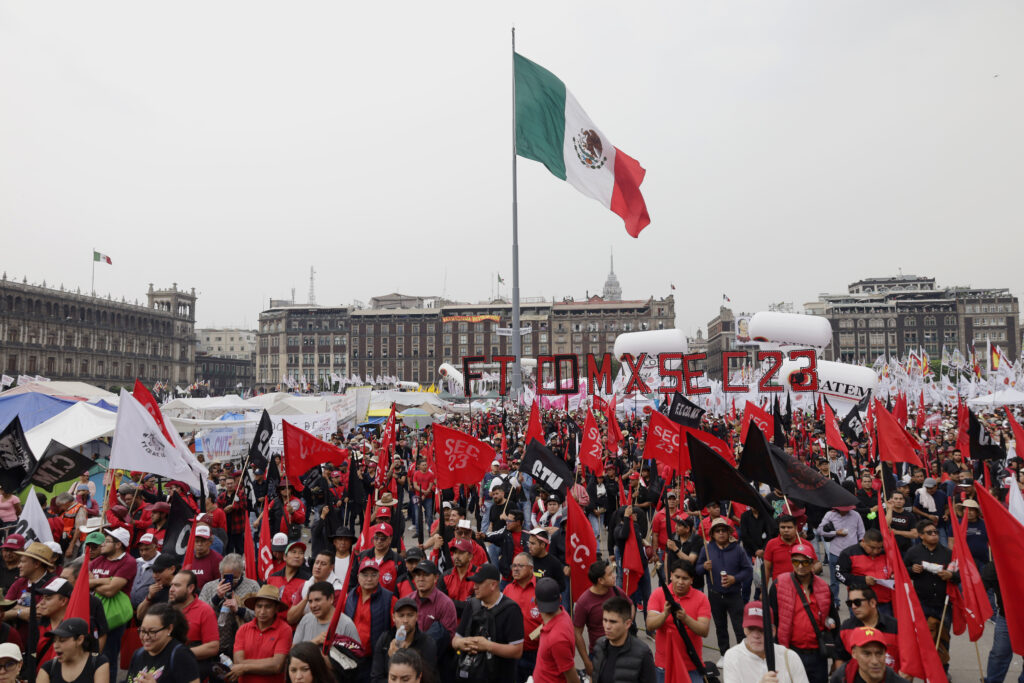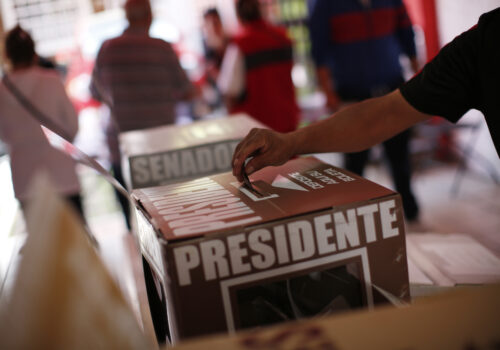Sunday marks the biggest election day in Mexico’s history. One hundred million Mexicans are registered to cast ballots for more than twenty thousand positions across all levels of government. The task ahead for the most closely watched of those posts—the next president—will be a daunting one, with much riding on two other electoral outcomes: the composition of Mexico’s Congress and the US election five months later.
Following the official three-month presidential campaign, polling indicates that one candidate has a firm lead. Assuming former Mexico City Head of Government Claudia Sheinbaum performs on par with expectations—the latest Reforma poll gives her a 20 percentage point lead over former Senator Xóchitl Gálvez—the candidate of the governing MORENA party will become Mexico’s first female president on October 1. The lack of movement in this poll since the campaign season began on March 1 is noteworthy. Sheinbaum has only dropped 3 percentage points (to 55 percent support) in the last three months. Other polls give Sheinbaum a lead of anywhere from 11 to 22 percentage points, with voter turnout one of the major factors to watch on Sunday.
More uncertain is what will happen in Mexico’s Congress. What has scuttled attempts by the current Mexican president, Andrés Manuel López Obrador, to fully carry out some elements of his government’s plan has been the checks provided by Congress. With a simple majority of seats—rather than the supermajority of two-thirds of the seats—the MORENA coalition rallied to pass some important pieces of legislation, but it has been impeded from making major constitutional changes, including controversial proposals for the popular election of Supreme Court judges and eliminating independent regulators.
Thus, this Sunday’s vote will determine whether López Obrador’s hand-picked successor, Sheinbaum, could advance the outgoing president’s stymied constitutional proposals. Polls—although less numerous and harder to calculate given the sheer number of candidates up for election (628 combined senators and deputies)—indicate continuity in Congress. Polls by the newspaper El Financiero, for example, predict that the MORENA coalition will secure 49 percent of the seats in the Chamber of Deputies with opposition parties taking 40 percent. The check on power provided by Congress in this scenario, in which MORENA would lack a supermajority, would likely give assurance to international markets, since uncertainty around such reforms and their repercussions can generate anxiety for investors.
Counting the ways to count
How does Mexico’s unique vote-counting work? While the final congressional breakdown will take some time to determine, expect declarations on the presidential winner on Sunday night. Hours after polls close, results will begin to be shared from two different systems that count votes: the quick count and the preliminary electoral results program (PREP).
The quick count takes a predetermined, statistically representative sample of polling stations, and then it gives a minimum and maximum possible vote percentage for each candidate. Results are expected to be announced around 11:00 p.m. (CST), with all eyes on whether the margin of possible votes indicates a clear winner. The PREP, which is operational beginning at 8:00 p.m. (CST), reports results in real time from all polling stations as transmitted, which means that urban votes are likely to be accounted for earlier in the process. And to make things even more complicated, the official counting does not begin until June 5, thus the importance of the earlier vote-counting methods to give more timely results.
The other election
The next Mexican president will also have a keen interest in the vote-counting on November 5. The US election, and in particular how Mexico figures into the campaign leading up to election day, will set the stage for the coming years of bilateral ties. A newly inaugurated Mexican president may be forced to immediately respond to US campaign rhetoric.
Security and migration are top issues both north and south of the Rio Grande. While Sheinbaum has pledged to continue the current government’s focus on social and educational programs to reduce violence, Gálvez favors a strategy that puts greater emphasis on the security apparatus to combat crime. On migration policy, both candidates would continue to take a human-centered approach that recognizes and seeks to find solutions to the high demand for labor. A third important bilateral issue will be the review period of the United States-Mexico-Canada Agreement, also known as USMCA, as the 2026 sunset clause approaches. This is all the more important now that Mexico is the United States’ number one trade partner. Here, a new Atlantic Council report suggests several ways that the next Mexican administration can unlock even greater border commercial efficiencies and new trade and investment.
Amid a fast-changing global order, a prosperous Mexico and strong US-Mexico ties will be increasingly important for the United States. US and Mexican security and economic concerns are deeply intertwined, as are their people. Sunday’s vote will set a crucial marker for how the relationship develops for the rest of the 2020s.
Jason Marczak is vice president and senior director of the Atlantic Council’s Adrienne Arsht Latin America Center.
Further reading
Thu, May 23, 2024
With the 2024 Mexican election looming, here are two major recommendations for the next president
Report By Ignacia Ulloa Peters, Martin Cassinelli, María Fernanda Bozmoski, Charlene Aguilera
Mexico is in a privileged position to leverage its border with the United States and deep commercial integration with the rest of North America, facilitated by the United States-Mexico-Canada Agreement (USMCA). The incoming administration has the opportunity to improve border efficiencies and unlock meaningful new investment throughout 2024-2030 and beyond.
Tue, Apr 23, 2024
Mexico’s next president must address violence against women in rural areas
New Atlanticist By Charlene Aguilera, Isabel Chiriboga
Whoever is elected on June 2, the next Mexican president will need to address the surge of violence against women, especially in remote states.
Mon, Jan 22, 2024
With elections in Mexico and the US, 2024 is a pivotal year for North American trade
New Atlanticist By Luz María de la Mora
The leaders elected in Mexico on June 2 and in the United States on November 5 will be responsible for conducting an important review of the USMCA in 2026.
Image: Claudia Sheinbaum is closing her campaign for the presidency of Mexico for the MORENA party in the Zocalo of Mexico City. (Photo by Gerardo Vieyra/NurPhoto)



